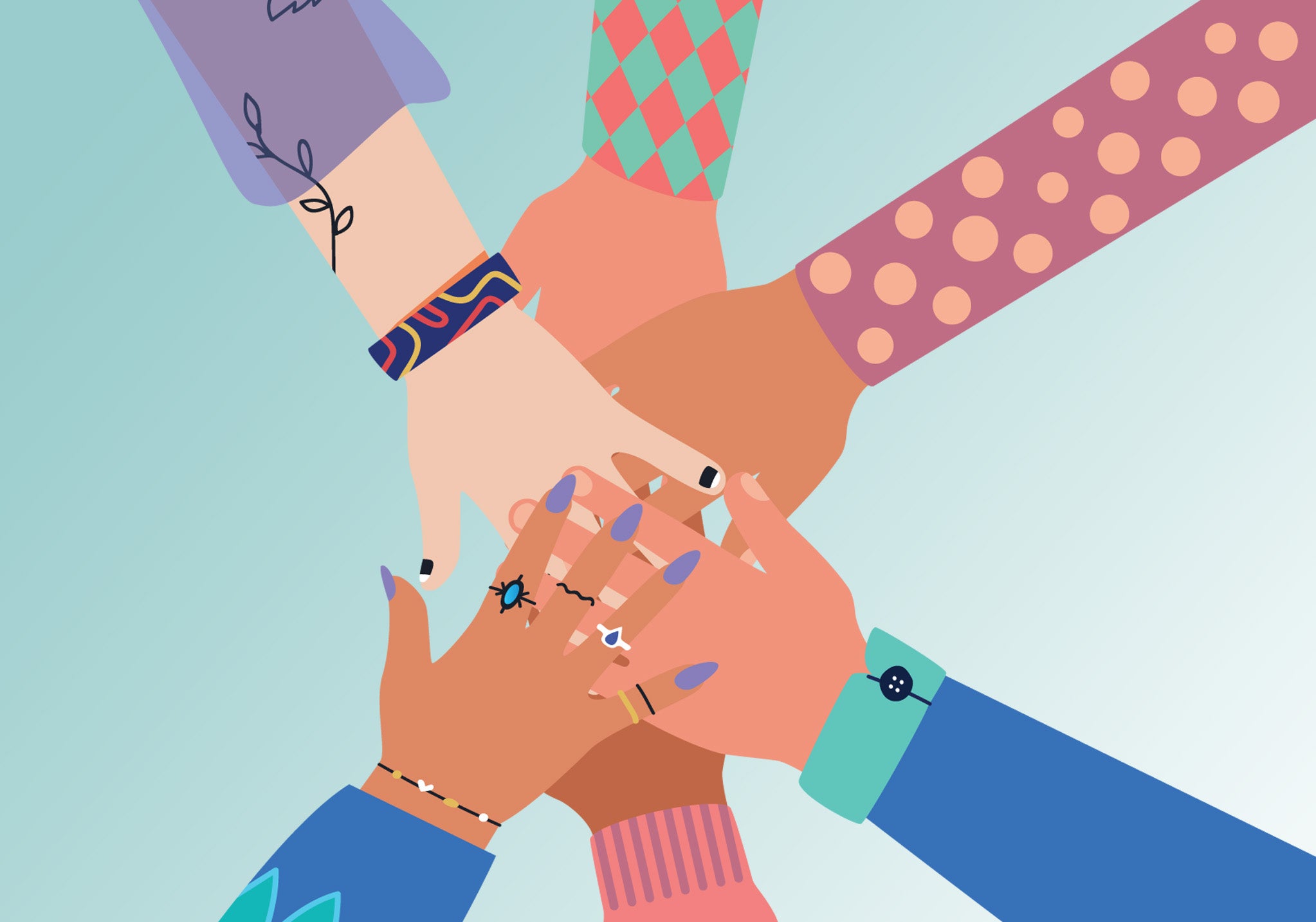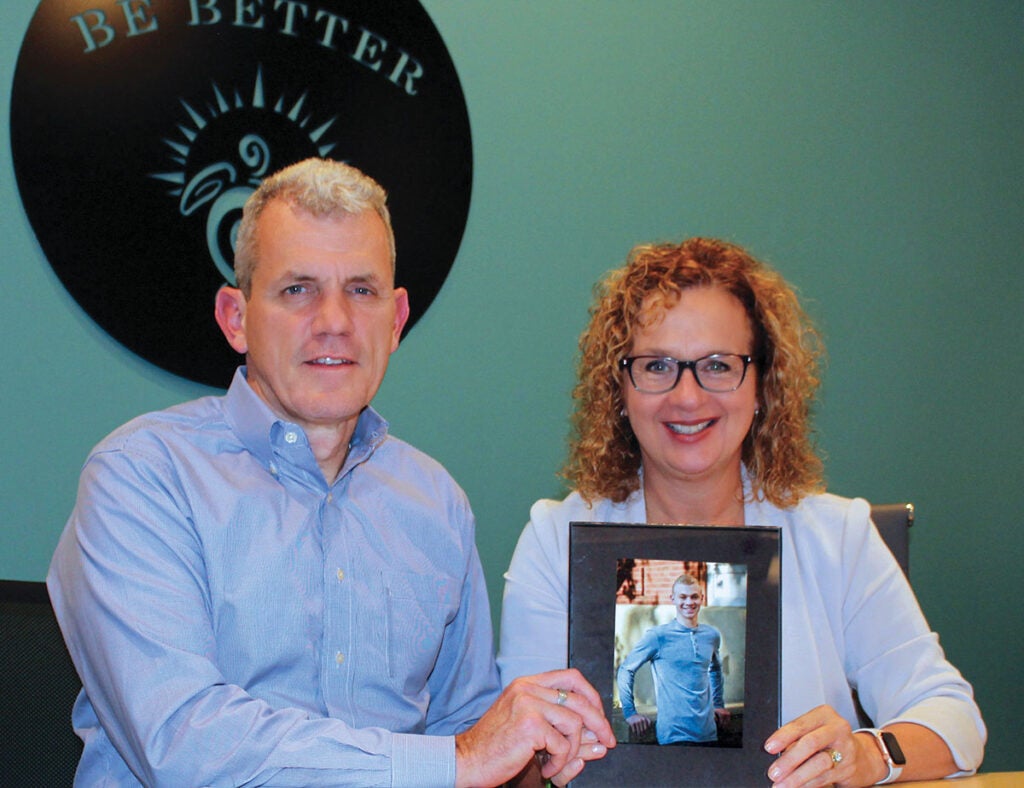
Their Mission: Mental Health Support with No Handoffs
Steve and Jill Miskelley founded Be Better; after losing their son to mental illness in 2020. The organization is focused on providing immediate and ongoing support, navigation, and education for people in need of mental health care—and for their families and communities.
By Lauren Rebecca Thacker
If there is one thing that Steve Miskelley ’93 and Jill Miskelley ’93 want parents to know, it’s this: “You know your kid better than anybody. If you see that they need help, advocate for them. It doesn’t matter how successful they seem or how high functioning they are. Success can’t heal what’s inside.”
Steve and Jill’s story started when they met at URI Orientation. They were both members of the International Engineering Program’s (IEP) inaugural class. The new program allowed students to earn dual degrees—a B.S. in engineering and a B.A. in German (it has since expanded to offer five other languages). Despite the fact that neither knew a word of German, Steve and Jill decided to go for it. Many German companies were known for their precision engineering, they reasoned, and the opportunity to have an engineering internship in another country appealed to them.
Pursuing the same program meant they would be spending a lot of time together, though the reason that their schedules ended up so synced still causes a lighthearted disagreement.
“It was not by design,” Steve says. “Jill will tell you I was too busy having fun to make my own schedule.”
Laughing, Jill says, “That’s exactly what happened! Back then, all the courses were on paper and you registered by standing in a long line. I skipped an orientation mixer so I could review the course catalog and figure out my schedule. When the morning came and it was time to get in the registration line, Steve hadn’t picked any classes. So, I let him copy my schedule, and we ended up in all the same classes for our first two years.”
Pursuing the dual degree, not to mention undertaking an internship entirely in their non-native language, was a lot of work. But Steve and Jill stuck with it and completed the program. They married and settled in Holland, Mich., where they raised their children, Chelsea and Ian.
Working hard toward a goal became something of a family trait: Chelsea is in medical school and, before his death, Ian was one of the nation’s top-ranked swimmers and studied at the University of Michigan.
Ian also lived with depression, which began when he was around 11 years old. Jill says his struggles made Ian especially compassionate and that coaches and teammates often remarked on his habit of checking in on someone who might be having a tough day. Ian—and his family—worked to manage his mental health care, but they often faced gaps in care or roadblocks to treatments. He died by suicide in 2020.
After Ian’s death, Steve and Jill were determined to create something meaningful in his honor.
They met Michael Brashears, a psychologist with extensive experience in clinical and family psychology. They were impressed by his caregiving skills and connected with him over shared experiences: Like them, Brashears has New England roots and knows what it is like to lose a loved one to suicide.
As time passed, Steve says, “We started to get more energy and even became a little excited about the idea of building something. The three of us got together and laid out a vision for what we wanted to do. The first thing we knew we needed to do was fill the gaps in a system that is fragmented. When we sought care for Ian, we found a series of hurdles and handoffs.”
Together, Steve, Jill, and Brashears founded Be Better; to provide education and support for individuals in need of mental health treatment and, importantly, their families and communities.
People who contact the nonprofit will get a callback within hours and can receive therapist recommendations, treatment suggestions, and general guidance. Brashears does not provide diagnoses but can make assessments and call on his decades of experience to answer questions. Be Better; will even provide transportation to appointments if needed.
In addition to one-on-one support, Be Better; offers virtual support groups for adults, young adults, and teens, as well as an educational series on topics including athletes and mental health, navigating the mental health system, and supporting a loved one with mental illness.
“We don’t hand people off, we follow up,” says Steve. “We check in regularly, asking ‘Are you getting what you need?’ or ‘Is this therapist a good fit?’ With Ian, we didn’t have someone shepherding us through this whole process. Providing that for others is the single most important piece of work we’re doing right now.”

Steve and Jill Miskelley with a photo of their son Ian. They founded Be Better; in Ian’s memory.
“We don’t hand people off, we follow up.”Steve Miskelley
Jill imagines what it might have been like for their family if an organization like Be Better; had been available.
“There were so many times I would drop Ian off at swimming and know that something was wrong,” she says. “I’d wonder, ‘What’s the right thing to say? What’s the wrong thing? Am I just overreacting?’ Or his medication would be increased and I’d see it wasn’t working, but there was no way to follow up with the doctor for weeks. Be Better; can act as an objective resource for answering questions and making connections, for everyone involved in care.”
The whole-family approach is reflected in all aspects of the organization. Ian’s older sister, Chelsea Garcia, contributes to Be Better; while she is in medical school, and the organization’s name comes from a eulogy that Steve’s brother gave at Ian’s funeral.
“He said, ‘Ian made us better by knowing him. That was his greatest superpower.
So be better, make his memory matter,’” Steve says. “So, that became our rallying cry. We’re trying to make things better for people who are struggling and families trying to navigate the medical system. We included the semicolon in the name because for people in the mental health community, it’s a significant symbol for mental health awareness and suicide prevention.”
After a career in education, Jill devotes her time to Be Better;. Steve works in technical sales and calls on his engineering experience every day.
“The IEP has been the primary driver of my career,” says Steve. “I worked for German and Austrian companies, and speaking German gave me a lot of credibility and the opportunity to connect culturally with my colleagues. Especially in technical discussions, being able to communicate exactly as you want is so important.”
When they were in college, Steve and Jill were busy with academics, internships, and activities, including Greek life. That’s why, for Jill, the memories of downtime together stand out.
“We were stuck in the computer lab all the time,” she remembers. “But I think our favorite place to go was the Quad. We’d just sit on the benches and laugh together.”
Steve and Jill laugh when they talk about Ian, too, remembering his sarcastic sense of humor and how he’d watch Family Guy and poke fun at his family’s Rhode Island accents.
“He was compassionate, kind, humorous, and unapologetically himself,” Jill says. “We recently went to an event with his team at the University of Michigan, and one of his coaches said that as many times as Ian got knocked down, he’d get up—again and again. Thinking of that, some days, helps me get through what we’re doing.”
“Ian’s perseverance is what drives us,” says Steve.
If you are in crisis, please call, text, or chat with the Suicide and Crisis Lifeline at 988, or contact the Crisis Text Line by texting HOME to 741741.
Photo: Courtesy Steve and Jill Miskelley;
Illustration: iStock
The Semicolon
Grammatically, a semicolon implies a continuation, rather than an end. It has been adopted, often as a tattoo, to represent hope, strength, and solidarity in the face of suicide, depression, and other mental health issues.
Ian Miskelley had a semi-colon tattoo on his wrist, and for the Miskelleys, it was important to incorporate the symbol into their organization’s name. “We are striving to Be Better; to make Ian’s memory live on and continue what he was working towards.”
To learn more about Be Better; visit bebetterholland.com.

